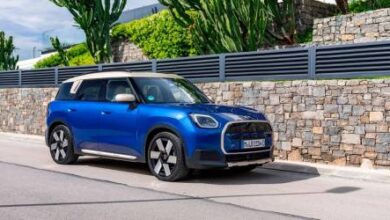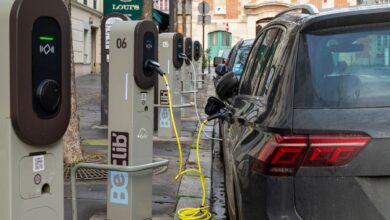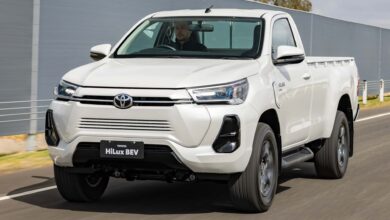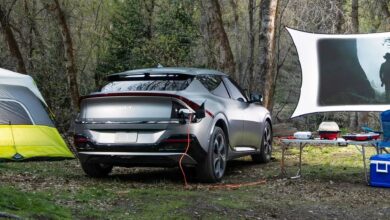VivaTech 2024: Safer EV batteries, flying taxis and automated planes showcased in Paris
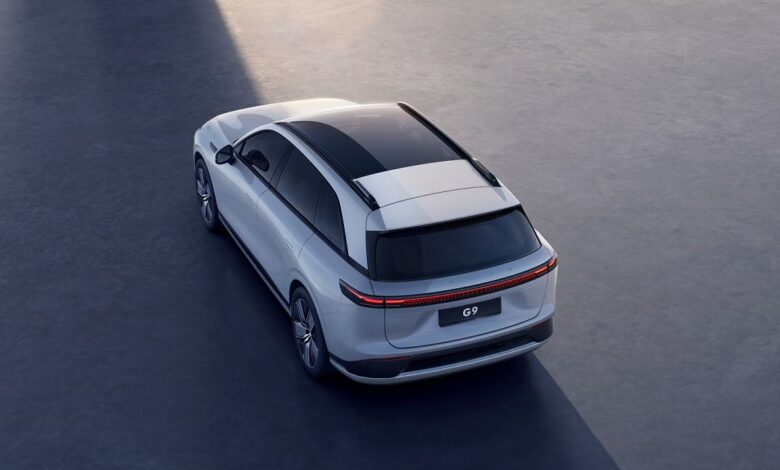
Transport companies are presenting their latest innovations at the VivaTech. On land and in the air, the trends are electrification and autonomy.
Over the years, VivaTech technology fair in Paris has established itself as an important event for car manufacturers looking to raise their profile on the European market.
Tesla has chosen it this year to present its Cybertruck, recently launched in the United States but has not yet been authorised in France.
The 5-metre-long behemoth had to make the journey to the show in an even larger truck.
Chinese electric car manufacturers have also confirmed their European ambitions for 2024 with a considerable presence in Paris.
China’s ambitions in Europe
Xpeng, founded by billionaire XiaoPeng and touted as a rival to Elon Musk, is showing off its G9 SUV, which it describes as a top-of-the-range “software-based vehicle” with an 800V battery that cuts charging time by almost half.
“Breaks at the gas station become painless. You just have time for a coffee and you’re ready to go,” Xpeng France spokesman Thomas Rodier told Euronews Next.
The manufacturer already has a presence in Scandinavia, the Netherlands, and Germany, and is arriving in France in June where it hopes to open 55 dealerships by 2025.
Some industry experts believe that Chinese electric vehicles in Europe could pose tough competition for European manufacturers in the coming years.
“We’re coming up with a technology that’s much more advanced than what’s available in Europe, where we’ve been stuck with combustion engines for many years,” explained Rodier.
“In 2009, the Chinese government decided that there should only be electric vehicles. They are 15 years ahead of Europe,” said Jean-Briac Dalibard, spokesperson for BYD France.
BYD, China’s number one car manufacturer for 11 consecutive years, has chosen to present a hybrid model at VivaTech. BYD is already present in 21 countries across the continent. It will also be an official sponsor of UEFA Euro 2024 tournament.
Asked whether European manufacturers were afraid of the arrival of BYD on the old continent, Dalibard said “they can be both scared and happy, because we are also supplying batteries for international brands, so it’s a good thing for them as well”.
The 100,000-engineer brand is showcasing its BLADE II (Lithium Iron Phosphate) battery technology at VivaTech, which BYD considers to be “one of the most secure batteries on the market”. It already equips a number of manufacturers, including Mercedes.
Fewer emissions from air travel
One device is not going unnoticed at this year’s event: the electric flying taxi from the German company Volocopter, which still hopes to fly passengers during the Paris 2024 Olympic Games.
These are expected to be test flights only. But the manufacturer, chosen by Aéroports de Paris (ADP) to provide shuttle services between the four recently-built Parisian so-called “vertiports,” still awaits the necessary authorisations to begin commercial flights.
Aircraft manufacturer Airbus, which outperformed Boeing in 2023, is presenting a taxi assistance system in the form of a truck fitted with an A350 cockpit, designed to test the future autonomy of aircraft on the ground.
“If you are coming from 20,000 aircraft today to 40,000 aircraft in a few years from now, we need to take care of the congestion at airports,” Michael Augello, CEO of Airbus Upnext, told Euronews Next.
The Optimate programme is presented as a support for pilots and operators, but there is no question of autonomy in flight for the moment.
Airbus is also enjoying the show to highlight its decarbonisation programme. The manufacturer aims to market its first hydrogen-powered aircraft in 2035.
“We have a clear roadmap. We are investing heavily into getting the infrastrucutre and the technology. We are believing in that and we are making significant efforts to keep on advancing,” said Augello.
To decarbonise its fleet, Airbus has signed a multitude of partnerships. It has recently joined forces with the French energy company Qair to produce sustainable aviation fuel (SAF) in France by 2030, a project costing some €800 million.
“For low-emission cars, we won’t do any better than electric. We can imagine hydrogen-powered aircraft by 2050, but there are still a large number of challenges,” said Jérôme Billerey, senior consultant and former Managing Director France at Qair.
Hydrogen as a carbon-free solution
Billerey mentioned the need to minimise energy loss during electrolysis, or to produce and store hydrogen at a competitive price.
One of the solutions favoured by certain companies is that of e-fuels obtained through the combination of green hydrogen and CO2.
Qair has started building a major hydrogen plant in southern France, where it is also planning to launch a large offshore wind farm. The company also plans to produce green hydrogen in Brazil and Iceland.
“The idea is to bring to the European market hydrogen that will be needed in the very near future at a competitive price,” explained Frans Schuman, Group Communication Director at Qair.
“You may not like electric power because of the batteries, you may not like hydrogen because it’s difficult to store, but the truth is that to decarbonise, we’re going to have to rely on these two vectors over the next few decades. We’re lucky in that we can produce them using renewable energies,” added Billerey.
